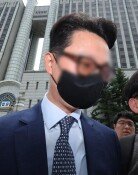North Korea-U.S. Discussion on HEU Elimination
North Korea-U.S. Discussion on HEU Elimination
Posted February. 25, 2004 23:06,
Both Koreas, the United States, China, Japan and Russia each made their position clear on how to solve North Korean nuclear crisis through keynote addresses on the first day of the plenary session at the second round of six-party talks held at the Fang Fei Garden of Daioyutai State Guest House in Beijing, China on February 25.
The two delegations, led by the U.S. Assistant Secretary of State James Kelly and North Korean Deputy Foreign Minister Kim Gye-kwan, discussed major issues such as North Koreas use of high enriched uranium (HEU) and the abolishment of nuclear development in which the two nations showed differing views in the first bilateral talks of this session that afternoon.
South Korean chief delegate Deputy Foreign Minister Lee Soo-hyuck, after reiterating a three-step solution to guarantee the North Korean regime, proposed to hold six-way talks every two months, to create a working group meeting attended by assistant level delegates while the main talks are ongoing, and to hold the first working group meeting in two weeks time after the cessation of the second six-party talks in his keynote address. North Korean chief delegate Kim Gye-kwan, in his greeting that day, said, North Korea will be flexible while it holds onto its consistent principles.
Meanwhile, CIA director George Tenet stated on February 24 that North Korea is continuing to develop a nuclear program and is also trying to produce biological and chemical weapons.
Tenet testified in the U.S. Senates Intelligence Committee that day saying, We believe that North Korea is pushing for a producible HEU nuclear program based on technologies provided by Pakistani scientist Abdul Qadeer Khan.
Yoo-Sung Hwang yshwang@donga.com srkim@donga.com







